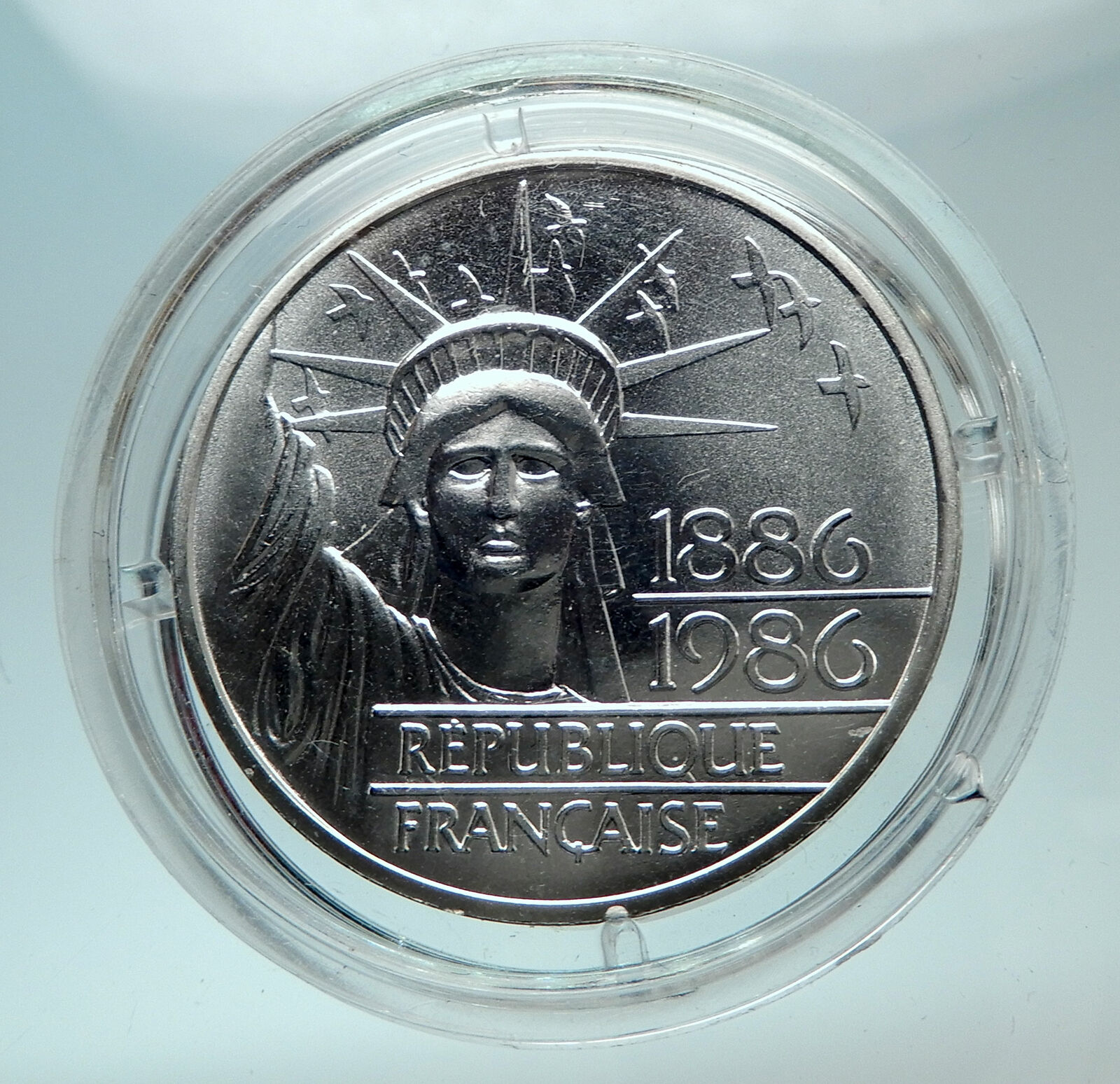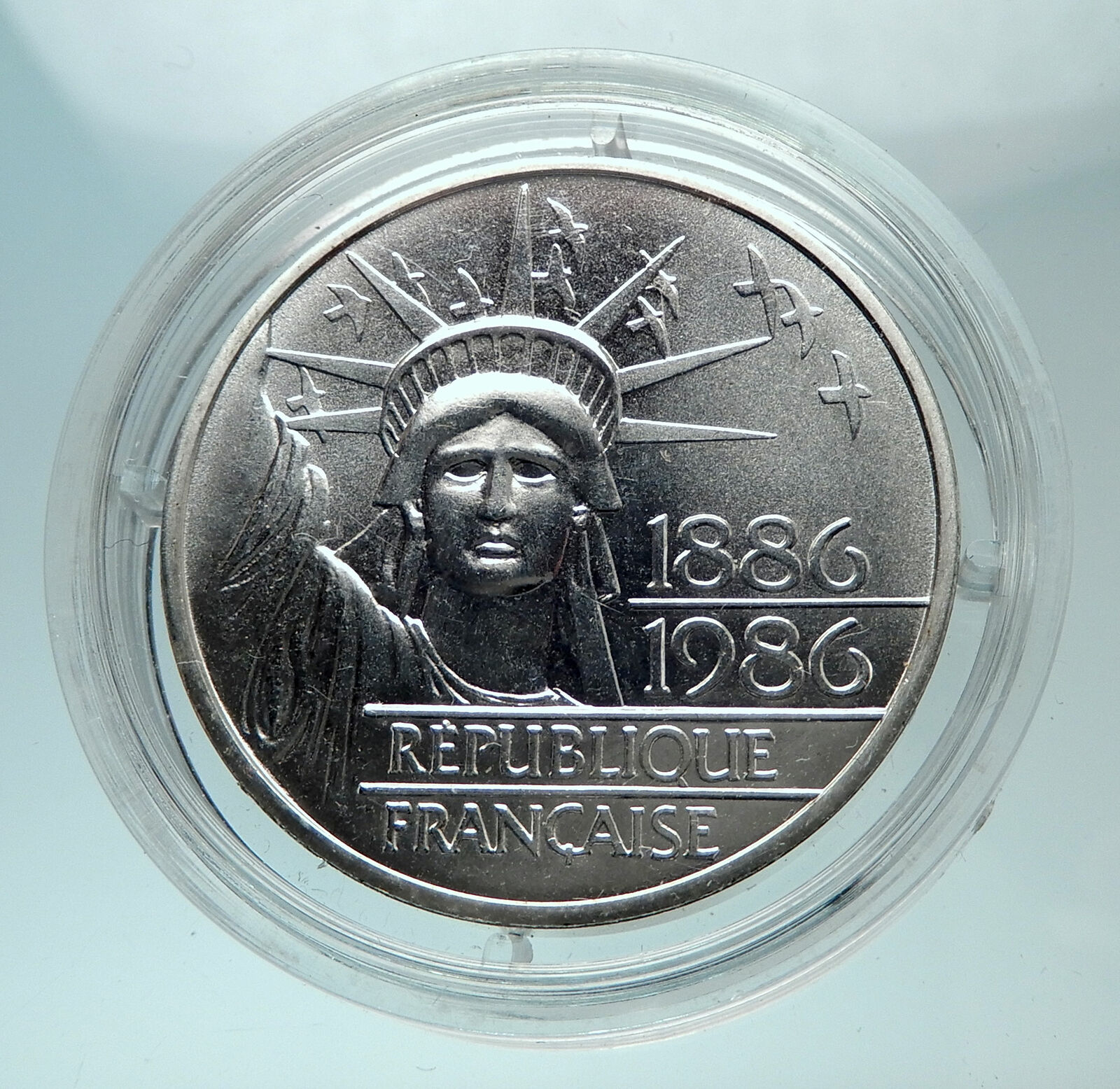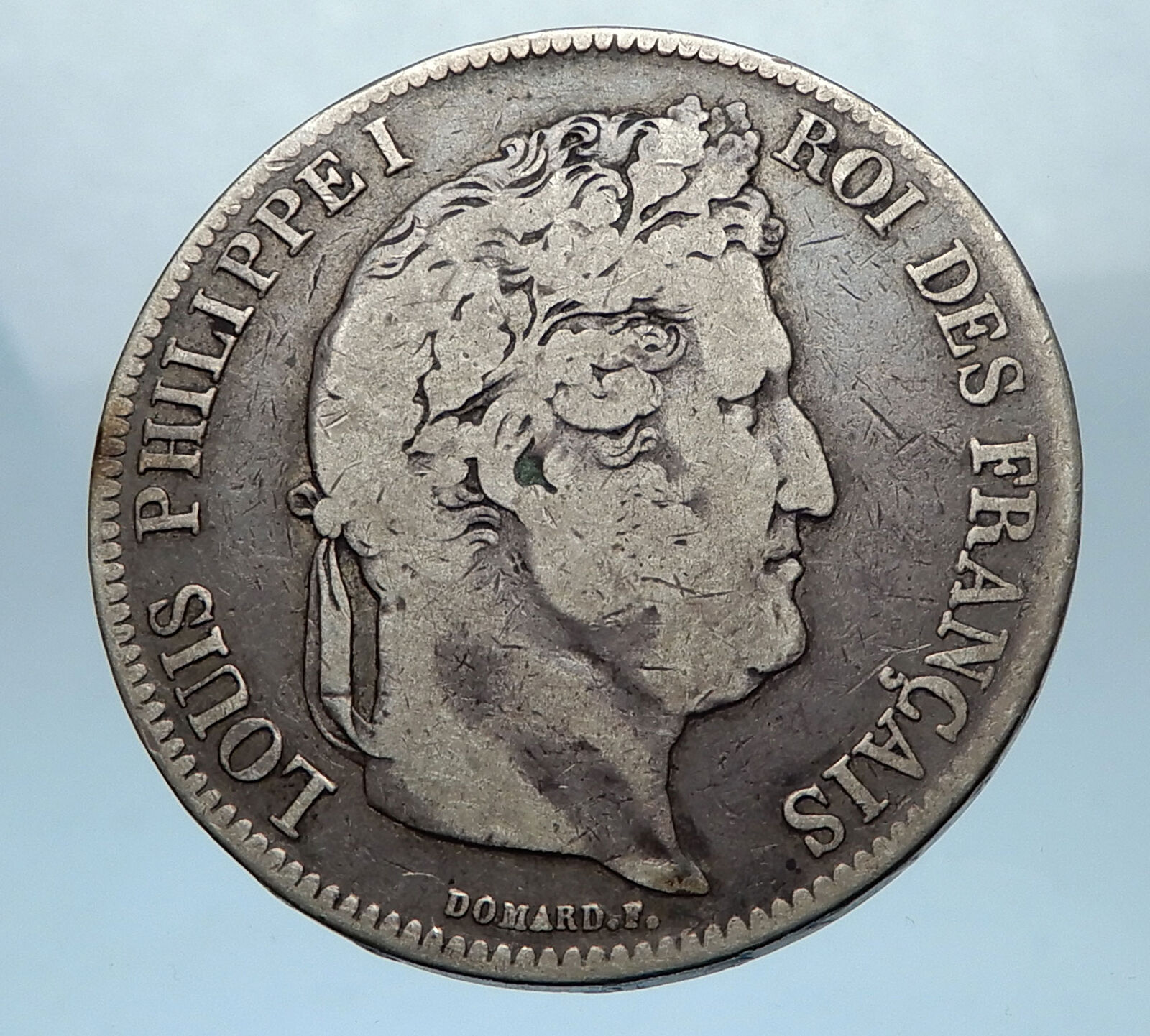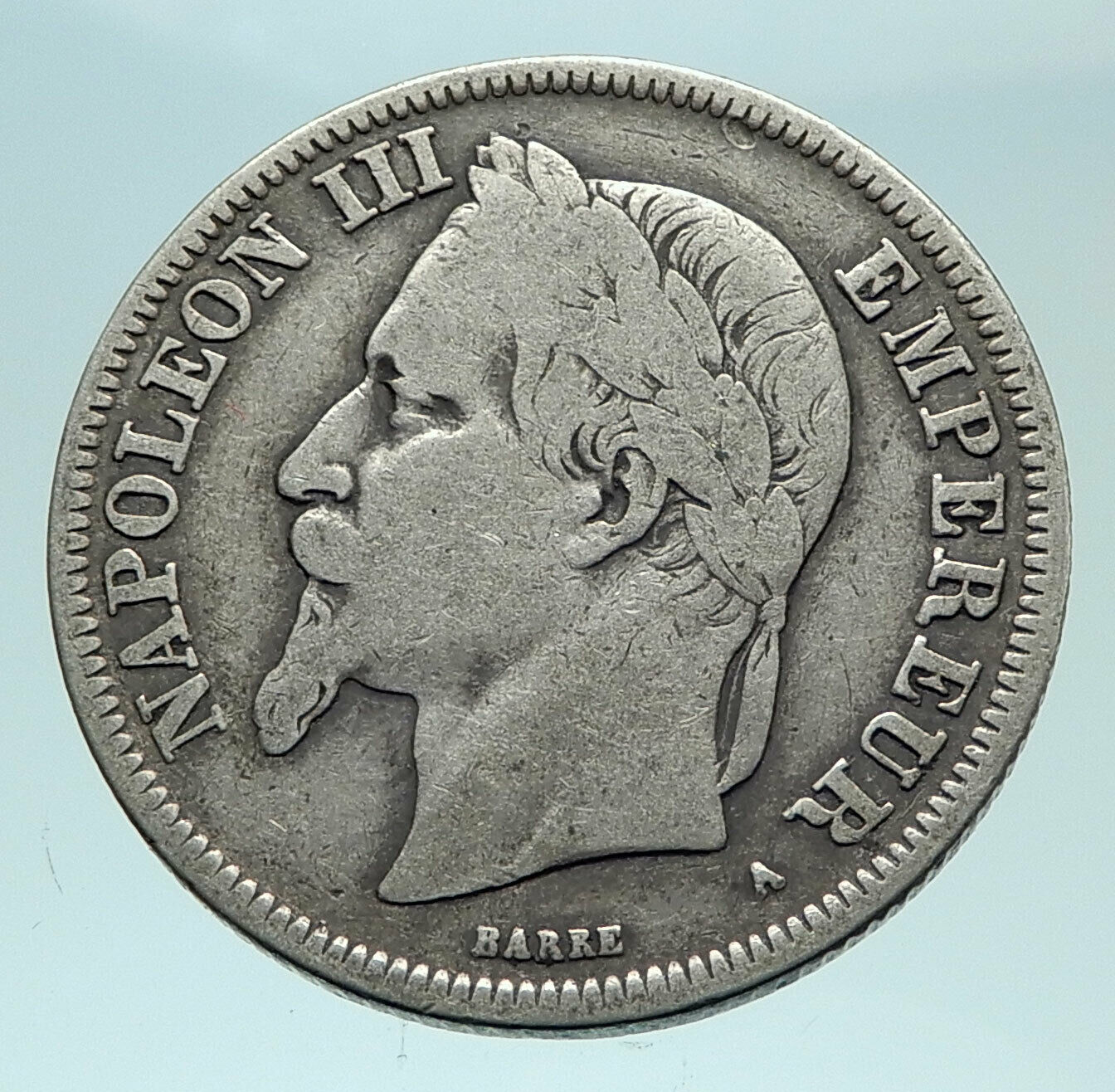|
France – 230th Anniversary of the birth of La Fayette
1987
BU Silver 100 Francs 31mm (14.97 grams) 0.900 Silver (0.4340 oz. ASW)
Reference: KM# 962
GÉNÉRAL LA FAYETTE D’AP B. DUVIVIER · RÉPUBLIQUE FRANÇAISE ·,
La Fayette facing left.
LIBERTÉ ÉGALITÉ FRATERNITÉ 100F 19 87 DURAND-MEGRET,
Liberty cap over inscription.
You are bidding on the exact item pictured, provided with a Certificate of Authenticity and Lifetime Guarantee of Authenticity.
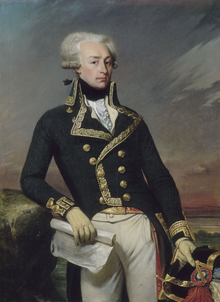 Marie-Joseph Paul Yves Roch Gilbert du Motier, Marquis de Lafayette (6 September 1757 – 20 May 1834), known in the United States simply as Lafayette, was a French aristocrat and military officer who fought in the American Revolutionary War, commanding American troops in several battles, including the Siege of Yorktown. After returning to France, he was a key figure in the French Revolution of 1789 and the July Revolution of 1830. Marie-Joseph Paul Yves Roch Gilbert du Motier, Marquis de Lafayette (6 September 1757 – 20 May 1834), known in the United States simply as Lafayette, was a French aristocrat and military officer who fought in the American Revolutionary War, commanding American troops in several battles, including the Siege of Yorktown. After returning to France, he was a key figure in the French Revolution of 1789 and the July Revolution of 1830.
Lafayette was born into a wealthy land-owning family in Chavaniac in the province of Auvergne in south central France. He followed the family’s martial tradition and was commissioned an officer at age 13. He became convinced that the American revolutionary cause was noble, and he traveled to the New World seeking glory in it. He was made a major general at age 19, but he was initially not given American troops to command. He was wounded during the Battle of Brandywine but still managed to organize an orderly retreat, and he served with distinction in the Battle of Rhode Island. In the middle of the war, he sailed for home to lobby for an increase in French support. He returned to America in 1780 and was given senior positions in the Continental Army. In 1781, troops under his command in Virginia blocked forces led by Cornwallis until other American and French forces could position themselves for the decisive Siege of Yorktown.
Lafayette returned to France and was appointed to the Assembly of Notables in 1787, convened in response to the fiscal crisis. He was elected a member of the Estates General of 1789, where representatives met from the three traditional orders of French society: the clergy, the nobility, and the commoners. After forming the National Constituent Assembly, he helped to write the Declaration of the Rights of Man and of the Citizen with Thomas Jefferson’s assistance. This document was inspired by the United States Declaration of Independence and invoked natural law to establish basic principles of the democratic nation-state. He also advocated the end of slavery, in keeping with the philosophy of natural rights. After the storming of the Bastille, he was appointed commander-in-chief of France’s National Guard and tried to steer a middle course through the years of revolution. In August 1792, radical factions ordered his arrest, and he fled into the Austrian Netherlands. He was captured by Austrian troops and spent more than five years in prison.
Lafayette returned to France after Napoleon Bonaparte secured his release in 1797, though he refused to participate in Napoleon’s government. After the Bourbon Restoration of 1814, he became a liberal member of the Chamber of Deputies, a position which he held for most of the remainder of his life. In 1824, President James Monroe invited him to the United States as the nation’s guest, and he visited all 24 states in the union and met a rapturous reception. During France’s July Revolution of 1830, he declined an offer to become the French dictator. Instead, he supported Louis-Philippe as king, but turned against him when the monarch became autocratic. He died on 20 May 1834 and is buried in Picpus Cemetery in Paris, under soil from Bunker Hill. He is sometimes known as “The Hero of the Two Worlds” for his accomplishments in the service of both France and the United States.
  Francee, officially the French Republic (French: République française), is a sovereign state comprising territory in western Europe and several overseas regions and territories. The European part of France, called Metropolitan France, extends from the Mediterranean Sea to the English Channel and the North Sea, and from the Rhine to the Atlantic Ocean. France spans 640,679 square kilometres (247,368 sq mi) and has a total population of 67 million. It is a unitary semi-presidential republic with the capital in Paris, the country’s largest city and main cultural and commercial centre. The Constitution of France establishes the state as secular and democratic, with its sovereignty derived from the people. Francee, officially the French Republic (French: République française), is a sovereign state comprising territory in western Europe and several overseas regions and territories. The European part of France, called Metropolitan France, extends from the Mediterranean Sea to the English Channel and the North Sea, and from the Rhine to the Atlantic Ocean. France spans 640,679 square kilometres (247,368 sq mi) and has a total population of 67 million. It is a unitary semi-presidential republic with the capital in Paris, the country’s largest city and main cultural and commercial centre. The Constitution of France establishes the state as secular and democratic, with its sovereignty derived from the people.
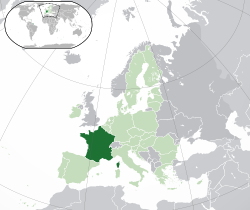
During the Iron Age, what is now Metropolitan France was inhabited by the Gauls, a Celtic people. The Gauls were conquered in 51 BC by the Roman Empire, which held Gaul until 486. The Gallo-Romans faced raids and migration from the Germanic Franks, who dominated the region for hundreds of years, eventually creating the medieval Kingdom of France. France emerged as a major European power in the Late Middle Ages, with its victory in the Hundred Years’ War (1337 to 1453) strengthening French state-building and paving the way for a future centralized absolute monarchy. During the Renaissance, France experienced a vast cultural development and established the beginning of a global colonial empire. The 16th century was dominated by religious civil wars between Catholics and Protestants (Huguenots).
France became Europe’s dominant cultural, political, and military power under Louis XIV. French philosophers played a key role in the Age of Enlightenment during the 18th century. In 1778, France became the first and the main ally of the new United States in the American Revolutionary War. In the late 18th century, the absolute monarchy was overthrown in the French Revolution. Among its legacies was the Declaration of the Rights of Man and of the Citizen, one of the earliest documents on human rights, which expresses the nation’s ideals to this day. France became one of modern history’s earliest republics until Napoleon took power and launched the First French Empire in 1804. Fighting against a complex set of coalitions during the Napoleonic Wars, he dominated European affairs for over a decade and had a long-lasting impact on Western culture. Following the collapse of the Empire, France endured a tumultuous succession of governments: the monarchy was restored, it was replaced in 1830 by a constitutional monarchy, then briefly by a Second Republic, and then by a Second Empire, until a more lasting French Third Republic was established in 1870. By the 1905 law, France adopted a strict form of secularism, called laïcité, which has become an important federative principle in the modern French society.
France reached its territorial height during the 19th and early 20th centuries, when it ultimately possessed the second-largest colonial empire in the world. In World War I, France was one of the main winners as part of the Triple Entente alliance fighting against the Central Powers. France was also one of the Allied Powers in World War II, but came under occupation by the Axis Powers in 1940. Following liberation in 1944, a Fourth Republic was established and later dissolved in the course of the Algerian War. The Fifth Republic, led by Charles de Gaulle, was formed in 1958 and remains to this day. Following World War II, most of the empire became decolonized.
Throughout its long history, France has been a leading global center of culture, making significant contributions to art, science, and philosophy. It hosts Europe’s third-largest number of cultural UNESCO World Heritage Sites (after Italy and Spain) and receives around 83 million foreign tourists annually, the most of any country in the world. France remains a great power with significant cultural, economic, military, and political influence. It is a developed country with the world’s sixth-largest economy by nominal GDP and eight-largest by purchasing power parity. According to Credit Suisse, France is the fourth wealthiest nation in the world in terms of aggregate household wealth. It also possesses the world’s second-largest exclusive economic zone (EEZ), covering 11,035,000 square kilometres (4,261,000 sq mi).
French citizens enjoy a high standard of living, and the country performs well in international rankings of education, health care, life expectancy, civil liberties, and human development. France is a founding member of the United Nations, where it serves as one of the five permanent members of the UN Security Council. It is a member of the Group of 7, North Atlantic Treaty Organization (NATO), Organisation for Economic Co-operation and Development (OECD), the World Trade Organization (WTO), and La Francophonie. France is a founding and leading member state of the European Union (EU).
|





 Marie-Joseph Paul Yves Roch Gilbert du Motier, Marquis de Lafayette (6 September 1757 – 20 May 1834), known in the United States simply as Lafayette, was a French aristocrat and military officer who fought in the American Revolutionary War, commanding American troops in several battles, including the Siege of Yorktown. After returning to France, he was a key figure in the French Revolution of 1789 and the July Revolution of 1830.
Marie-Joseph Paul Yves Roch Gilbert du Motier, Marquis de Lafayette (6 September 1757 – 20 May 1834), known in the United States simply as Lafayette, was a French aristocrat and military officer who fought in the American Revolutionary War, commanding American troops in several battles, including the Siege of Yorktown. After returning to France, he was a key figure in the French Revolution of 1789 and the July Revolution of 1830. 
 Francee, officially the French Republic (French: République française), is a sovereign state comprising territory in western Europe and several overseas regions and territories. The European part of France, called Metropolitan France, extends from the Mediterranean Sea to the English Channel and the North Sea, and from the Rhine to the Atlantic Ocean. France spans 640,679 square kilometres (247,368 sq mi) and has a total population of 67 million. It is a unitary semi-presidential republic with the capital in Paris, the country’s largest city and main cultural and commercial centre. The Constitution of France establishes the state as secular and democratic, with its sovereignty derived from the people.
Francee, officially the French Republic (French: République française), is a sovereign state comprising territory in western Europe and several overseas regions and territories. The European part of France, called Metropolitan France, extends from the Mediterranean Sea to the English Channel and the North Sea, and from the Rhine to the Atlantic Ocean. France spans 640,679 square kilometres (247,368 sq mi) and has a total population of 67 million. It is a unitary semi-presidential republic with the capital in Paris, the country’s largest city and main cultural and commercial centre. The Constitution of France establishes the state as secular and democratic, with its sovereignty derived from the people.


